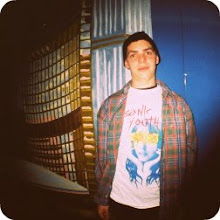
The modest Englishmen took the stage first, to many people who came out early to see the evenings opening act. Male Bonding ripped through their opener, “All Things This Way,” furiously – without letting anyone catch their breath and then quickly went into their recent single, “Weird Feelings.” Male Bonding, who’ve been on tour since May, have become a solid and tight unit. John Arthur Webb (on guitar) is composed yet shy, often thanking the crowd in between songs. But his distorted surf chords were played with precision. Kevin Hendricks (on bass) is a key component to the band’s rhythm section and was uniquely dancing throughout the band’s set – you would be able to spot those weird slide steps from anywhere. When a young lady asked to shake his hand and tried to pull him into the crowd, he pushed back, fighting to keep his footing. The band might not be comfortable with, or used to, all the recent attention. “Stop fraternizing with us, you’re making us screw up!” Webb joked with the crowd.

Through all the “You Rock!” shout outs, the band remained highly focused, playing the majority of Nothing Hurts. The exceptional, stand out drumming from Robin Christian is maybe the best in scene today, pounding with such fury and complexity on tracks such as“Crooked Scene,” “T.U.F.F.” & “Pumpkin.” However, what really excited the crowd was when the band played their first single, “Year’s Not Long.” In a small venue that holds roughly 250 people, the sound reverberated so perfectly that the bartenders stopped selling drinks for that one. The band finished on a high note with a sped up version of new song, “Can’t Dream,” which the band recorded for their Daytrotter session this summer. Best Coast drummer and former Vivian Girl, Ali Koehler came on stage to supply back up vocals (which she and her former band supplied on the recording). The band may be shy, but that may be because all the focus is on the music. It is easy to lose yourself during a Male Bonding show, that or either start smashing beer bottles and throwing chairs – their sound translates flawlessly in a live setting.

Best Coast front woman, Bethany Cosentino apologized to the crowd for being ill before picking up her guitar when she walked on stage, but being as her band from Los Angeles is the ‘it’ act at the moment, the crowd didn’t seem to care. As Best Coast broke into their first song, you couldn’t tell Cosentino was sick besides from occasionally horking into the back corner and guzzling water. Best Coast showcased many tracks from Crazy For You, including “Boyfriend,” “I Want To” and “Our Deal,” which were completely commended for by the crowd. You would think, with everyone gripping so closely to Crazy For You, it would be difficult to play your back catalog, but they did, courageously, and at times, no one moved because the songs were unfamiliar. Best Coast’s early EPs and out-of-print 7 inches cost a pretty penny these days.

As Bethany struggled with her cold, she delivered, rocking out in heels and floral pants, she took a second in between songs to hit a joint someone from the audience passed to her. “You’re all getting sick, y’know,” she coughed. Guitar player, Bobb Bruno, also hit the joint and thanked the crowd. Bruno supplies the 60′s surf and R&B elements to Best Coat’s sound and is one of the reasons that “Honey” was the climax of the night. Before they encored, Bobb sentimentally thanked Toronto and the band played “Something In The Way.” Plagued by illness and fighting vomit most of the show, Cosentino fought on lifted by the positive vibes from the crowd. Best Coast showed they are one of the premiere indie bands of the moment and since their success has come overnight, we may not be lucky enough to see them in such a small venue for long.
Published by A Heart Is A Spade





